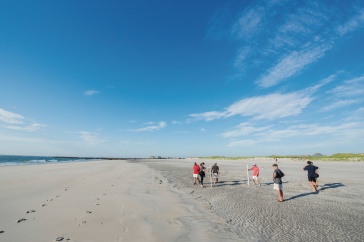
UNH is launching the Center for Acoustics Research and Education this summer. Illustration for ADEON by Colleen Mitchell.
UNH is launching a new center that will focus on the science of sound. The Center for Acoustics Research and Education (CARE) will bring together expertise across wide-ranging disciplines and provide acoustics research, education and outreach opportunities for the UNH community and government and industry partners across the U.S.
Acoustics is a branch of physics that involves the properties of sound waves; more specifically, CARE will initially focus on environmental acoustics, which takes into account sound movement through the air, on land and under water — but it’s more than just listening to whale songs.
“Acoustics is being used in ways it’s never been used before, like in the biomedical fields and for agricultural pest control,” explains Jennifer Miksis-Olds, research professor in the School of Marine Science and Ocean Engineering and director for CARE. “The fact that acoustics is becoming more widely applied to address everyday challenges highlights its importance.”
“There’s no center exactly like this in the nation, and there’s clearly a need for one.”
UNH already has faculty and staff who specialize in environmental acoustics and other related acoustics topics, but establishing an official center like CARE allows for improved collaboration, coordination, and visibility both within and outside the university, Miksis-Olds explains.
“We’ve got a core focus in underwater acoustics here at UNH, but our goal is to expand that into other fields, like music, speech, medicine and others,” says Anthony Lyons, research professor in the Center for Coastal and Ocean Mapping and CARE’s associate director for research. “There’s no center exactly like this in the nation, and there’s clearly a need for one.” Lyons adds that he’s heard back from industry and government partners who are excited to tap into the opportunities for professional development and collaboration in the acoustics field.
CARE’s interdisciplinarity makes it a natural fit within the UNH Institute for the Study of Earth, Oceans, and Space (EOS), where it will reside.
“We are delighted to add CARE to the EOS family of interdisciplinary centers of research excellence,” says Harlan Spence, director for EOS. “I am particularly pleased that education is an integral element of CARE; though EOS is known for our research, education is always inextricably intertwined in our overall mission.”
Dan Howard, assistant professor of biological sciences, will serve as CARE’s associate director for education. CARE will offer professional development courses for those outside the university and will focus on developing a graduate certificate program for UNH students within its first year.

“At the moment, we don’t have a graduate program in acoustics, but there are a lot of UNH students who are using acoustics in their research,” Lyons says. “Their degrees might be in Earth sciences or oceanography, but they don’t have a way to convey their acoustics specialization on their resumes. CARE will offer courses for these students so they can get a certificate in acoustics, thus allowing them to be recognized at some level as being an expert in acoustics and give them an edge when applying for jobs.”
Outreach will be another critical component of CARE’s offerings, and Miksis-Olds has already partnered with the UNH arts community. As part of her work with the Atlantic Deepwater Ecosystem Observatory Network (ADEON), Miksis-Olds invited an artist to join the ADEON science crew on a cruise two years ago that has resulted in an artistic rendering of the underwater sound research. The art will be featured this fall as part of Ocean Discovery Day and as a featured community seminar at UNH.
“Acoustics is a technical field but there are so many community and society applications that should be celebrated,” she says. “A lot of people don’t think about acoustics unless it’s a problem — like highway noise or bad acoustics in a restaurant or concert hall,” Miksis-Olds says, “but I would like us to celebrate acoustics for its positive values and for its contributions in helping us address societal challenges.”
CARE will host a kickoff meeting on June 18, 2019, from 2-5 p.m. in 301 Morse Hall for anyone interested in learning more or to find out how to get involved in the center’s activities.
The Institute for the Study of Earth, Oceans, and Space (EOS) is UNH’s largest research enterprise, comprising six centers with a focus on interdisciplinary, high-impact research on Earth and climate systems, space science, the marine environment, seafloor mapping, and environmental acoustics. With more than $43 million in external funding secured annually, EOS fosters an intellectual and scientific environment that advances visionary scholarship and leadership in world-class research and graduate education.
-
Written By:
Rebecca Irelan | Institute for the Study of Earth, Oceans, and Space | rebecca.irelan@unh.edu | 603-862-0990



















































